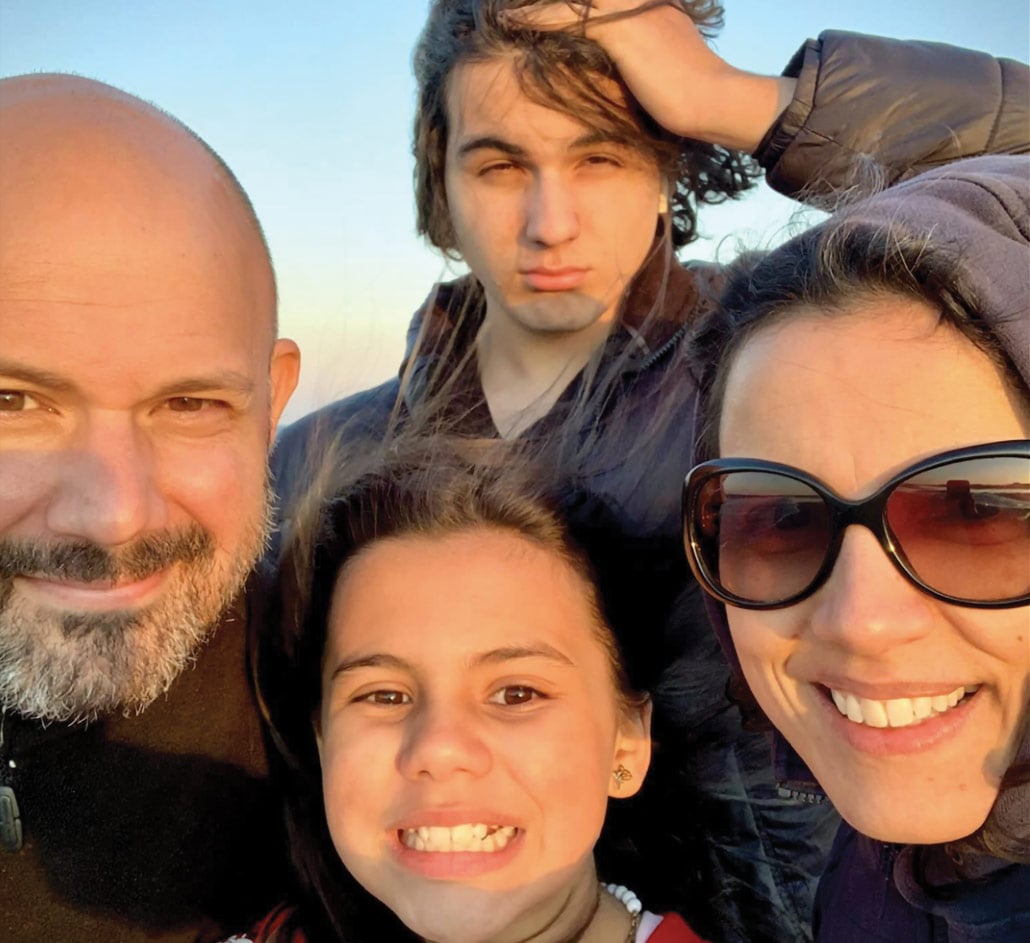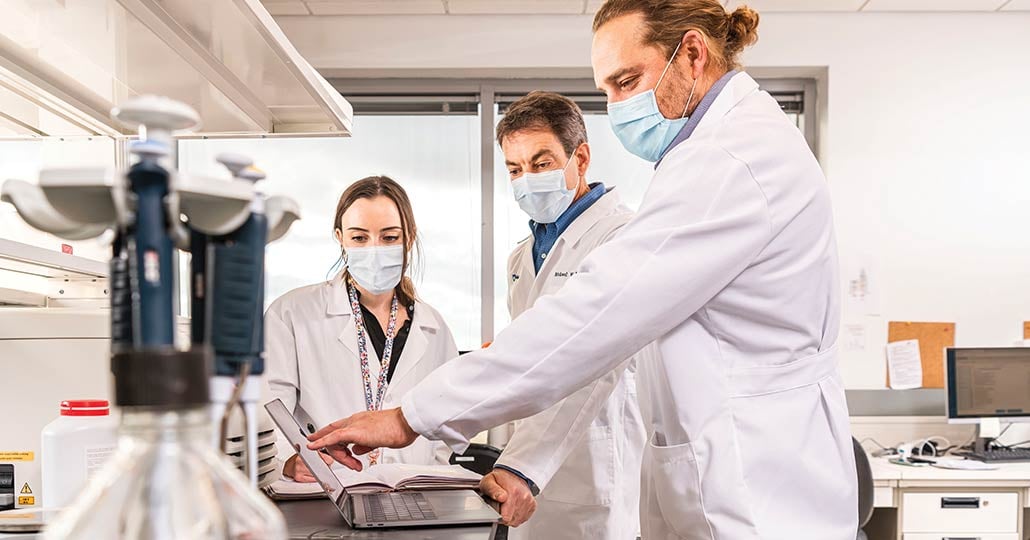FEATURE
The Chris Carson Effect
The friendship between a patient and a researcher leads to a game-changing philanthropic gift
by Andrea Simakis
Chris Carson wasn’t supposed to get Ewing’s sarcoma, a rare bone cancer that mostly affects children.
Not at 36. Not as a young father, raising a family with his high school sweetheart. When he was diagnosed, his son, Alex, was 7. His daughter, Sofia, had just turned 2.
But there he was at Cleveland Clinic for another round of chemotherapy, surrounded by kids. They were bald and attached to little IV poles. Though he’d been trained to take a beating as a soldier deployed to Iraq, the side effects of that “internal napalm,” as Chris called it, brought him to his knees. He was determined to live — at least long enough for his baby girl to remember him. As hard as the chemo was on him, it was harder on the children.
“He’d grab that pole with the drip coming into his arm and find as many kids as could get out of bed,” remembers his dad, Randy Carson. Then Chris and his small-fry posse would roam the halls, making the hospital visit a game. Anything to take their minds off the grueling treatments.
“Look,” Chris told his wife, Paula. “I’ve lived. I married the woman I wanted to marry. I had the most beautiful kids. I went to the war. I jumped out of airplanes. I learned a second language. I traveled all the continents. I started a business on my own, and I made it successful. I have no bucket list items.
“But these kids? They haven’t even begun their lives. It’s so unfair. I have to do something.” With bulldog tenacity, the former Green Beret enlisted the help of his father, a retired Eaton Corporation executive who had overseen the company’s electrical division. Chris put it this way: “Dad, when you get to the Pearly Gates, the fact that you made one more circuit breaker is not gonna get you through the door. But if we can save one child… ”
Orphan sarcoma cancers like Ewing’s are starved of research dollars and underrepresented in clinical trials. Only 4% of the money the government spends each year on cancer research is directed toward treating childhood cancer.
Using family money, the Carsons launched the Carson Sarcoma Foundation from their home base in Asheville, North Carolina, in 2014. Their mission statement was simple: Find a cure for the disease and help as many people as they could along the way. They wouldn’t build buildings. None of their money would go to paying administrative costs. Every penny would be plowed into science.
They knew they couldn’t raise billions, but they could be angel investors, strategically leveraging smaller amounts of money to help get promising ideas off the ground.
“I refuse to wait for a treatment to find me, to put my head down and take what’s given to me,” Chris wrote on the CSF website. “I will continue to push the boundaries of what we can do as a foundation.”

Chris Carson (far left) with son Alex, wife Paula and daughter Sofia. A few weeks before the accident, Chris texted this family selfie to a friend. “Can’t stop looking at it!” he wrote. “Sometimes I wish I could just pause time.” | Photo: Courtesy of Paula Carson
That passion for pushing boundaries led Chris and Randy Carson to the lab of Jacob Scott, MD, DPhil, a staff physician scientist in Cleveland Clinic’s Department of Translational Hematology and Oncology Research — THOR for short, like the Avenger who swings a mean hammer.
Dr. Scott was doing exciting work applying the principles of evolutionary biology to the problem of drug resistance in patients with Ewing’s sarcoma that has metastasized, spreading to other parts of the body.
That’s what happened to Chris in 2015 when a CT scan detected a mass on his lung. The cancer that had originated in his arm in 2012, in remission after surgery, chemo and radiation, had returned.
“Like many cancers, it can be cured it if we catch it early, but once it’s metastatic, the prognosis becomes really grim,” says Dr. Scott. Chemo works well for a while. “But it always stops working,” he says.
One reason? Cancer cells that are not killed by the chemotherapy mutate and become resistant to the drug. Once they multiply, these new drug-resistant cells take over.
But there’s a tradeoff, explains Dr. Scott. In the process of getting stronger against one drug, cancer cells develop weaknesses to other drugs. “All of these tumors have something they’re sensitive to,” he says. “It’s just a matter of identifying it.”
Dr. Scott and his team are running experiments to learn what those new weaknesses are. They hope to create a kind of manual, a giant lookup table of novel drugs to use on children with cancers that no longer respond to the typical treatment — drugs we already have that we never thought of using against Ewing’s sarcoma.
“Our underlying thesis is that maybe we don’t need to develop billion-dollar drugs,” says Dr. Scott. The Carsons were supposed to sit down with Dr. Scott for 20 minutes to go over his revolutionary concept. Two hours later, they were still talking.
Chris and Dr. Scott shared more than an interest in crushing a deadly disease. They were the same age, and so were their children. They’d served in the military at the same time — Chris in Special Forces, Dr. Scott as a submariner.
“He came home from the service, had kids and got Ewing’s sarcoma,” says Dr. Scott. “I came home from the service, had kids and started studying Ewing’s sarcoma. When we met, it was like we’d known each other forever. … He really became an evangelist for what I was doing.”

“Chris was tenacious, something between a bulldog and a snapping turtle, but with a heart of gold,” says Dr. Jacob Scott (far right), seen here with colleagues Jessica Scarborough, MS, MD/PhD candidate, and Michael Kattan, PhD. | Photo: Marty Carrick
Chris understood that his fellow veteran’s work could lead to the first real treatment breakthrough in Ewing’s and other cancers in decades.
Reasoning that bigger donations yielded faster results, he convinced other small family foundations to pool their resources. A $100,000 grant from the Carson Sarcoma Foundation spurred grants from the Alan B. Slifka Foundation ($80,000) and CHEMOWARRIOR: The Eli Sidler Foundation ($20,000) — all told, $200,000 to help Dr. Scott beat cancer at its own evolutionary game.
This, says Paula, is what’s known as “The Chris Carson Effect”: a tsunami of charisma, stubbornness and humor that carried you away. “When you met him, it was either absolute love or you couldn’t stand him,” she says. Most people loved him. Especially the parents of children with Ewing’s.
Chris was a one-man resource center for families desperate for information and consolation, according to his oncologist at Cleveland Clinic. “He would try to get them connected with the healthcare that they needed, clinical trials and each other,” says G. Thomas Budd, MD, “so they could support each other.”
The role came with a price. Martha Carson remembers her son on the phone with patients and parents for four to six hours a day. Every day.
Sometimes, father and son would travel to Cleveland to act as guides. “It really made a difference getting people to the right doctors who had the right experience,” says Randy. But all too often, despite the best available care, the children Chris befriended died. “That was something that was very, very hard on him,” says Martha.
They would also drop in on Dr. Scott, to see how the science they had funded was progressing and, last year, to share some good news. Despite Chris’s relapse nearly six years before, his most recent scans showed no new cancer. Dr. Budd was cautious but optimistic. The trio celebrated. Pictures were snapped. Smiles all around.
At home, Paula and Chris dared to imagine a future with Chris in it. More jam sessions with Alex on drums, Chris on blues guitar. More “spa treatments” with Sofia, who liked to paint Daddy’s nails a glittery purple. A week after returning from Cleveland, Chris took a break from his foundation work to go for a walk. He had survived war, jumping out of airplanes and a beast of a cancer. But as he strolled through suburban Asheville on a sunny day in April 2021, he was hit by a distracted driver. His injuries were catastrophic.
Christopher Corwin Carson died May 15, 2021. He was 45.
Here's the thing about determined, big-hearted men: The good they do never ends.
Today, because of the National Ewing Sarcoma Tumor Board, launched with a gift from the Carson foundation, doctors from across the country can present difficult cases to Ewing’s specialists to recommend the best treatment options. The first such board specific to Ewing’s, it’s a boon for patients everywhere, especially those who live far away from centers of expertise like Cleveland Clinic.
Dr. Scott’s findings in his study of metastatic Ewing’s sarcoma, made possible by the $200,000 in seed money that he received thanks to Chris Carson, have been so promising, he won a seven-year, $4 million grant from the National Cancer Institute to expand the scope of his research to include lung cancer, the leading cause of cancer death worldwide.
“Chris used his tenacity and natural leadership abilities to bring together bereaved families, small and large foundations and physicians to work together as a coalition, to maximize the impact of their donations for researchers like me,” says Dr. Scott. “I’ve never seen anything like it before — or since.”
Tenaciousness is clearly a family trait. The Carson Sarcoma Foundation is still taking donations and writing checks, under Randy’s leadership.
One of those checks, for $200,000, will go to buy a liquid-handling robot to help speed Dr. Scott’s cancer research. “We’re going to put a little plaque on it,” he says. “I’ll probably name it Chris.”
